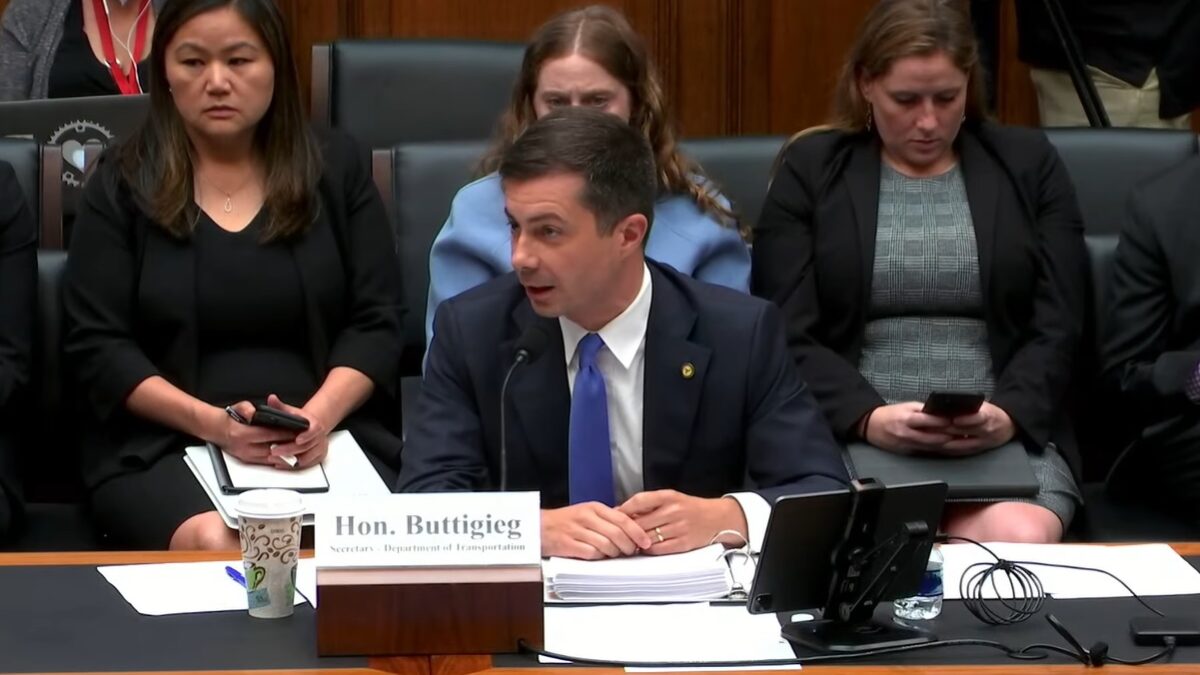Less than a month after the Biden regime declared high gas prices necessary for the “liberal world order,” Transportation Secretary Pete Buttigieg told lawmakers pain at the pump was essential to help elites pay for electric vehicles.
Testifying before the House Transportation and Infrastructure Committee on Tuesday, the 40-year-old transportation chief said an accelerated transition to “domestic clean energy production” was vital because “we’re running out of time” when it comes to climate change.
“We’re pursuing a policy that’s going to create more domestic clean energy production because we think that’ll lead to a better economy and it’ll save those lives and property,” Buttigieg said.
Never mind the rate of climate-related deaths has dropped more than 98 percent since the 1920s, with weather to blame for 0.07 percent of deaths worldwide and only 0.1 death per every 100,000 people in the United States in 2014. Weather disaster-related damage has also dropped from 0.26 percent of global GDP to 0.18 percent from 1990 to 2020 as nations develop with cheap, reliable energy offered by fossil fuels. Even as the globe grapples with massive heat waves, cold temperatures kill far more people than the heat does. Otherwise, the world is running out of time.
Buttigieg emphasized Tuesday the administration’s priority remained on “American-made domestic clean energy production” just days after Biden pleaded with Saudi Arabia to ramp up oil production because the president shut down operations here at home.
Moments later, the transportation secretary pitched government subsidies to lower the price of electric vehicles, which remain prohibitively expensive for American consumers coping with both high energy prices and inflation at a four-decade high. According to Kelley Blue Book in December, the average cost of an electric car is north of $56,400, or $5,000 more than an entry-level luxury car which averaged more than $51,300 in November.
High gas prices, Buttigieg told lawmakers, are an instrument of social engineering to raise the American appetite for alternatives to gasoline-powered vehicles.
“The more pain we are all experiencing from the high prices of gas, the more benefit there is for those who can access electric vehicles,” Buttigieg said to Florida Republican Congressman Carlos Gimenez. The secretary’s security detail uses a Ford Mach-E.
While nationwide gas prices have dropped more than 50 cents from their mid-June peak, the average cost for a gallon of regular unleaded remains at $4.49 which is up from $3.17 a year ago, according to AAA. The high energy prices are a consequence of the Biden administration’s suppression of domestic oil and gas production leading to a government-created scarcity.
“So you’re saying the more pain we have, the more benefit you’re gonna get?” Gimenez said in an effort to clarify Buttigieg’s remarks whose face turned red in the hearing.
“I know you want me to say that so bad but honestly sir, what we’re saying is that we could have no pain at all by making EVs cheaper for everybody,” Buttigieg said.
“EVs cheaper by subsidizing them?” Gimenez asked.
“Yes, that’s part of it,” Buttigieg responded.
In other words, raising the demand for electric vehicles with high gas prices will raise demand for government subsidies to enable wealthy Americans to afford cars often powered by coal or natural gas on the back end.
As transportation secretary, Buttigieg has been the administration’s lead proponent of the nationwide push toward electric vehicles. Last summer, President Biden launched a White House initiative to push auto sales to 50 percent electric by 2030 with new regulations. Absent from the White House announcement, however, was a serious effort to ramp up mining operations to produce the batteries over which Beijing currently wields a monopoly. The price to replace an electric car battery alone could run up to $20,000.









